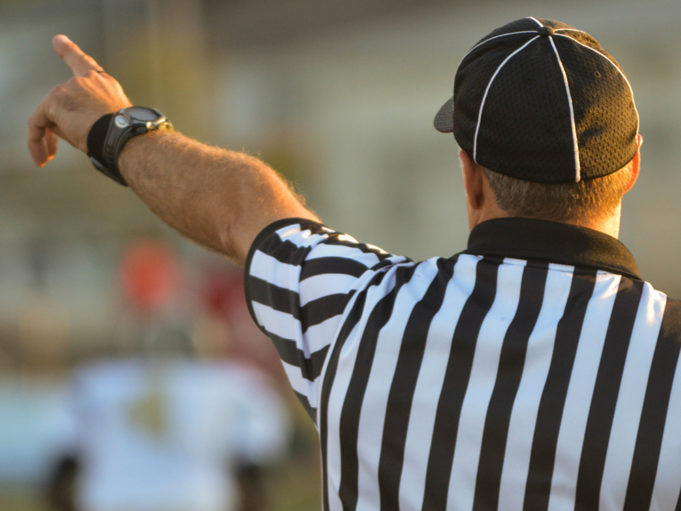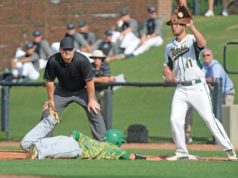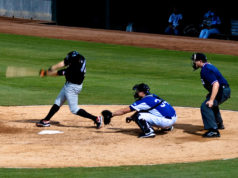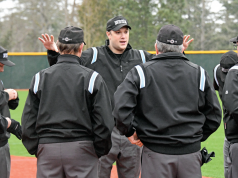The NFHS strives for consistency among all the sports for which it writes rules. The jurisdiction of officials has come under recent scrutiny as a result of a football game played in West Virginia a few years ago.
In that game a brawl erupted with only a few seconds remaining in the game. The referee terminated the game and for safety reasons, the police escorted the officials to their locker room. The crew immediately compared notes and determined which players from each team should be disqualified for their roles in the fight. The state association accepted the game report and the players were suspended for their next game. The parents sued, claiming the ejections were invalid because they were made after the official’s jurisdiction had ended.
Eventually, the ejections were upheld and the playoffs ended without that team in the state final. The NFHS rule on officials’ jurisdiction now takes that incident into account. Except where noted, the following applies equally to NFHS, NCAA and pro rules.
Assuming responsibility. In addressing umpires’ jurisdiction, one must be careful because not all codes have a “magic moment” when the umpires assume complete responsibility for all events. Both NFHS and NCAA phase in umpire control.
Under pro rules, it is straightforward. The umpires hold a pregame meeting at home plate five minutes before the scheduled game time and the umpires assume control when the home team’s lineup is delivered to the plate umpire (4.01).
In NFHS play, the pregame meeting is also at the five-minute mark, but the umpires’ jurisdiction begins when they arrive within the confines of the field (10-1-2). Although not explicitly stated in the rule, the intent is for jurisdiction to begin when the umpires enter the field with the intent of supervising the game. If the umpires arrive 30-60 minutes prior to the game and an umpire goes onto the field to inform the home coach that the umpires are present, that does not begin umpire jurisdiction.
Once the umpires have jurisdiction, they cannot call the game because of unsuitable playing conditions until the game begins. Therefore, by letter of the rule, the plate umpire must get all players in position to start the game and call “Play,” before he can suspend the game (4-1-1, 4-1-5).
In college play, the pregame meeting is to be held 10 minutes before game time and the plate umpire is in charge after the lineups have been exchanged (4-4). However there are two exceptions that give the umpires limited jurisdiction prior to the aforementioned time. Jurisdiction in regard to personal confrontations and unsportsmanlike conduct directed toward the officiating staff begins when the umpires enter the game site (3-6k). Umpires’ jurisdiction with regard to the tobacco rule (3-11) begins upon their arrival on the field or dugout in uniform. The use of all tobacco products by student-athletes and game personnel (e.g., coaches, umpires, athletic trainers, managers) is prohibited during practice sessions, game competition or at the site of competition.
Doubleheaders. The codes also vary as to whether the second game of a doubleheader shall not be started because of unsuitable weather conditions or the unfit condition of the playing field. In NFHS play, the decision belongs to the umpires (4-1-1). In NCAA and pro, the umpire in chief of the first game is the sole judge (NCAA 4-2c; pro 3.10b).
End of jurisdiction. Pro rules are silent on the end of jurisdiction so the obvious conclusion is when the umpires leave the playing field. In NCAA play, jurisdiction in regard to personal confrontations and unsportsmanlike conduct directed toward the officiating staff ends when the umpires have left the game site (3-6k). In reality, once the game ends, there is no issue other than the preceding for the umpires to rule.
The NCAA has a formal post-participation ejection. If a situation occurs after the last out of a contest and such conduct would result in an ejection during the normal course of play, or a player is ejected after being removed from the contest, a post-participation ejection is made (2-26b). The ejection penalty is served in the same manner as any other ejection and applies to the next scheduled game (2-26 AR 3). A suspension may also apply.
In high school games, umpire jurisdiction ends when the umpires leave the playing field; however, as a result of the West Virginia incident, they retain clerical authority over the contest through the completion of any reports, including those imposing disqualification, that are responsive to actions occurring while the umpires had jurisdiction. State associations may intercede in the event of unusual incidents after the umpires’ jurisdiction has ended or in the event that a game is terminated prior to the conclusion of regulation play (10-1-2).
Play: After a game, the losing coach goes to the parking lot to give the umpires a critique of their performance and verbally attacks them. Ruling: In NFHS, the coach cannot be formally ejected, but a game report should be filed with the state association for appropriate action. In NCAA, the coach shall receive a post-participation ejection. In pro, a report should be filed with the governing authority.
What's Your Call? Leave a Comment:
Note: This article is archival in nature. Rules, interpretations, mechanics, philosophies and other information may or may not be correct for the current year.
This article is the copyright of ©Referee Enterprises, Inc., and may not be republished in whole or in part online, in print or in any capacity without expressed written permission from Referee. The article is made available for educational use by individuals.


















